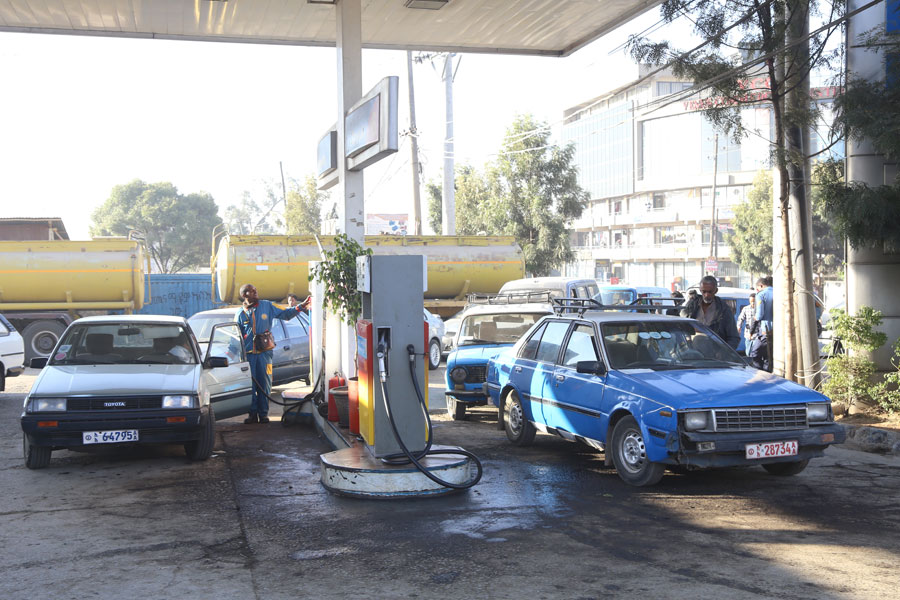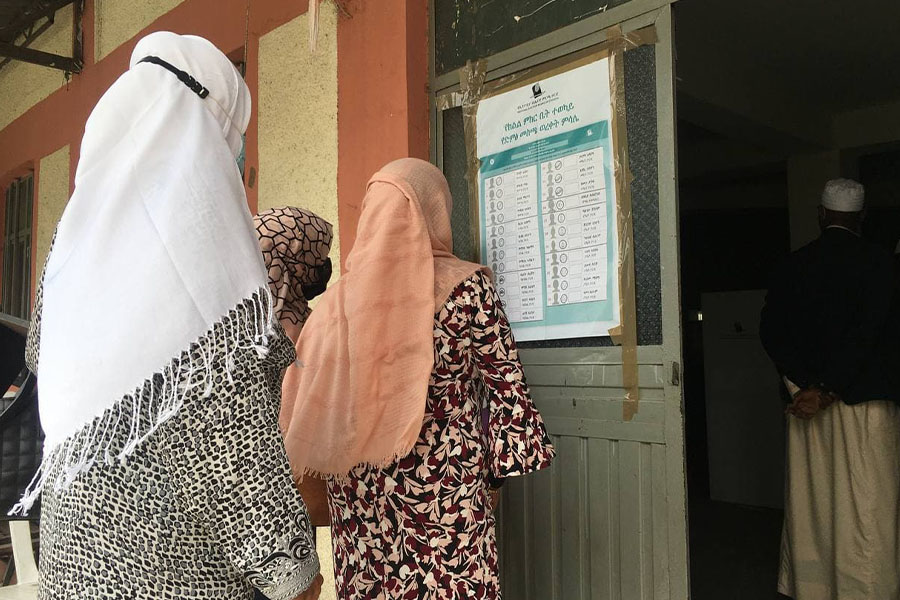
Fortune News | Jan 19,2019
In what is becoming a frequent feature of Addis Abeba's gas stations, long queues were ubiquitous last week due to increased supply towards regional states and a slowdown of imports from Djibouti. Benzene shortages were particularly prevalent at the 225 gas stations in the capital, where many customers were being returned as they drove up for a refill.
The Petroleum & Energy Authority(PEA), which distributes fuel to the country's 1,590 fuel stations, pumped up its supply to regional states following increased requests for agricultural activities in the past few weeks.
Getachew Amogne, the Authority's distribution head, says the supply shortage was caused by increased demand for benzene for tractors and water pumps at irrigation projects. He says the amount that comes to the capital has decreased by up to 200,000 litres a day following the spike in the uptake of regions.
"Demand has skyrocketed over the past few weeks," Getachew told Fortune.
The official also believes that hoarding by some fuel retailers looking to profit from the periodical uptake in fuel prices that occurs when subsidies are removed exacerbated the shortage. However, Getachew acknowledged that Addis Abeba has received a few ten thousand litres below its daily demand of 1.5 million in the past few months due to several issues.
Some officials point to the decreased operational functionality of Djibouti's Doraleh Port as one of the main reasons for the supply shock.
Esmelalem Mehretu, CEO of the Ethiopian Petroleum Supply Enterprise(EPSE), says loading up on fuel at Djibouti has become a long and tedious process for trucks headed to Ethiopia over the past six months. He indicates that drivers wait for hours because filling up a single truck now takes three times as long, unlike 20 minutes a few months ago. Esmelalem says port operators dialled down the power of nozzles as part of fire safety precautions.
"There are several issues at Djibouti," the CEO told Fortune.
Esmelalem says the 200 trucks filled in a single day are significantly below the amount needed to supply Ethiopia's daily demand. Nonetheless, EPSE spent around 3.89 billion dollars last year to import 2.4 million tons of fuel from the terminals owned by Horizon Djibouti Terminals Ltd.
The terminal is a wholly owned subsidiary of the Emirates National Oil Company(ENOC), which operates out of two berths capable of accommodating 31 fuel tanks with 12 pumps, a 2000-ton-per-hour flow rate, and a storage capacity of nearly 400,000 cubic meters. A fire erupted five months ago, damaging the flow rate and plummeting daily diesel shipments to Ethiopia by three million litres from 10.
While EPSE negotiated to maintain supplies at around eight million, subsequent technical failures, a flood and time off for a holiday have led to frequent disruptions in the supply directed to Ethiopia over the past year.
The Enterprise relies on a series of depots located along Sululta Town, Sheger City, to ameliorate the impacts of short-term supply shocks on the nearly one million vehicles in the capital.
However, drivers dont quite feel that the shortages have been addressed. Zerihun Tesfa was quite timid in conducting his daily affairs last week to save himself from several hours-long queues at one of the gas stations.
"It is becoming too frequent," he told Fortune.
Girma Assefa, who manages a gas station on Debrezeit Road, concurs with the driver's observations. He has observed sales increase nearly fourfold, resulting in an empty inventory by midweek.
Dealers point to the redirection of supply to regional states as the main culprit behind the shock.
Ephrem Tesfaye, a Board Member of the Ethiopian Petroleum Dealers Association(EPDA), says illegality and poor distribution tactics have compounded the issues arising out of Djibouti. As a dealer for NOC, he has been receiving two-thirds of the demand for 1.5 million litres monthly.
"Someone is siphoning it off," Ephrem told Fortune.
While fuel reform, including the digitation of sales and removal of subsidies, has been one of the Federal government's priorities over the past two years, problems in supply and distribution have remained unresolved in the capital.
Veterans of the energy sector point to the lack of adequately mapped-out shock response strategies as the primary cause for the shortages.
Serkalem Gebrekirstos(PhD), former CEO of Dalol Oil, says a pervasive lack of forward-thinking and poor operational efficiency has long characterized the fuel distribution system in Ethiopia. He underscores the need for foresight from fuel authorities to ensure the regular continuation of daily affairs unless a major problem occurs.
"Fuel management is too sensitive an issue to remain unaddressed by long-term planning," Serkalem told Fortune.
The current representative of Habitable Energy Solutions Africa recommends diversifying import routes, frequently updating emergency response strategies, and increasing the backup inventory to better manage future supply shocks. Serkalem recalls imports of benzene coming from Sudan until a few years ago, which he thinks could be reconsidered as an option hereafter.
"Sitting idle until the next supply disruption is not an option," the expert says.
PUBLISHED ON
Jun 29,2024 [ VOL
25 , NO
1261]

Fortune News | Jan 19,2019

Editorial | Apr 22,2023

Radar | Mar 06,2021

Editorial | Dec 14,2024

Viewpoints | Jun 08,2019

Fortune News | Oct 07,2023

Radar |

Commentaries | Feb 27,2021

Commentaries | Aug 12,2023

Fortune News | Sep 30,2021

Dec 22 , 2024 . By TIZITA SHEWAFERAW
Charged with transforming colossal state-owned enterprises into modern and competitiv...

Aug 18 , 2024 . By AKSAH ITALO
Although predictable Yonas Zerihun's job in the ride-hailing service is not immune to...

Jul 28 , 2024 . By TIZITA SHEWAFERAW
Unhabitual, perhaps too many, Samuel Gebreyohannes, 38, used to occasionally enjoy a couple of beers at breakfast. However, he recently swit...

Jul 13 , 2024 . By AKSAH ITALO
Investors who rely on tractors, trucks, and field vehicles for commuting, transporting commodities, and f...

Sep 13 , 2025
At its launch in Nairobi two years ago, the Africa Climate Summit was billed as the f...

Sep 6 , 2025
The dawn of a new year is more than a simple turning of the calendar. It is a moment...

Aug 30 , 2025
For Germans, Otto von Bismarck is first remembered as the architect of a unified nati...

Aug 23 , 2025
Banks have a new obsession. After decades chasing deposits and, more recently, digita...